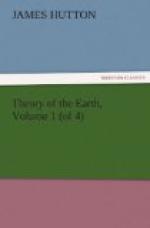In this manner we are led to the system of the world, or theory of the earth in general; for, that great change of situation, which our land has undergone, cannot be considered as the work of accident, or any other than an essential part in the system of this world. It is therefore a proper view of the necessary connection and mutual dependence of all those different systems of changing things that forms the theory of this earth as a world, or as that active part of nature which the philosophy of this earth has to explore. The animal system is the first or last of these; next comes the vegetable system, on which the life of animals depends; then comes the system of this earth, composed of atmosphere, sea, and land, and comprehending the various chemical, mechanical, and meteorologically operations which take place upon that surface where vegetation must proceed; and, lastly, we have the mineral system to contemplate, a system in which the wasting surface of the earth is employed in laying the foundation of future land within the sea, and a system in which the mineral operations are employed in concocting that future land.
Now, such must surely be the theory of this earth, if the land is continually wasting in the operations of this world; for, to acknowledge the perfection of those systems of plants and animals perpetuating their species, and to suppose the system of this earth on which they must depend, to be imperfect, and in time to perish, would be to reason inconsistently or absurdly. This is the view of nature that I would wish philosophers to take; but, there are certain prejudices of education or prepossession of opinion among them to be overcome, before they can be brought to see those fundamental propositions,—the wasting of the land, and the necessity of its renovation by the co-operation of the mineral system. Let us then consider how men of science, in examining the mineral state of things, and reasoning from those appearances by which we are to learn the physiology of this earth, have misled themselves with regard to physical causes, and formed certain mineralogical and geological theories, by which their judgment is so perverted, in examining nature, as to exclude them from the proper means of correcting their first erroneous notions, or render them blind to the clearest evidence of any other theory that is proposed.
When men of science reason upon subjects where the ideas are distinct and definite, with terms appropriated to the ideas, they come to conclusions in which there is no difference of opinion. It is otherwise in physical subjects, where things are to be assimilated, in being properly compared; there, things are not always compared in similar and equal circumstances or conditions; and there, philosophers often draw conclusions beyond the analogy of the things compared, and thus judge without data. When, for example, they would form the physical induction, with regard to the effect of fire or water upon certain substances




